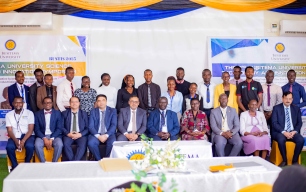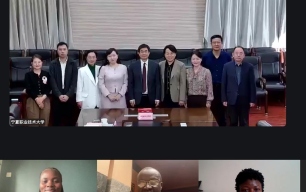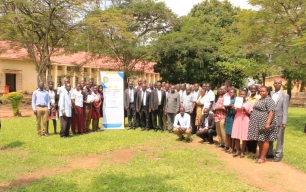Sewing Sustainability into Africa’s Textile Future

In the bustling textile markets of Nairobi, Addis Ababa, and Kampala, fabrics of every color and texture tell a story of vibrant culture and growing industry. But behind the lively trade lies a pressing challenge: waste, pollution, and a shortage of skilled workers trained in sustainable practices
A new project, METODIC (Strengthening the Links Between Industry and Academia for a Sustainable Textile Sector that Promotes Circular Economy in Sub-Saharan Africa), is weaving together an ambitious plan to change that. Launched in 2024 under the EU’s Erasmus+ Capacity Building in Higher Education programme, METODIC is bringing universities and industry closer than ever to create a more sustainable, circular, and globally competitive textile sector in the region.
Over the last decade, the textile industries of Kenya, Ethiopia, and Uganda have expanded rapidly, creating jobs and boosting exports. Yet, this growth has come at a cost. Factories often generate significant waste, rivers bear the impact of pollution, and many workers lack the training to adopt greener, more efficient practices.
This is not just about fabrics, it’s about the future of our environment, our industries, and our young people,” says Dr. Edwin Kamalha of Busitema University in Uganda, who coordinates part of the project. “METODIC is about giving students the right skills while helping businesses adopt sustainable solutions.”
At the heart of METODIC is education. The project is developing a new blended learning course for undergraduate students, focused on Sustainable and Circular Business Models in the Textile Industry. This course will introduce students to practical methods for reducing waste, reusing materials, and implementing cleaner production technologies.
Beyond classrooms, the initiative will set up Collaboration Centers at participating African universities. These centers will connect students with textile companies, providing spaces for workshops, internships, and joint projects. The aim is to ensure that graduates leave not just with theory, but with hands-on experience directly linked to industry needs.
One of METODIC’s defining strengths lies in its international partnerships. The project brings together universities from Greece and Belgium, a Greek consultancy company, and seven African universities. Through joint courses, academic exchanges, and job-shadowing programmes African students and lecturers will gain exposure to global best practices, while European partners learn from Africa’s unique industry landscape.
This exchange is designed to create a ripple effect equipping a new generation of African textile engineers and entrepreneurs with the skills to make the sector both sustainable and globally competitive.
The project’s ambitions are bold, but its vision is clear: to help Sub-Saharan Africa’s textile sector shift from linear “take-make-dispose” models to circular ones, where resources are conserved, waste is minimized, and innovation thrives.
For young students entering the textile field, this means learning not just how to make clothes, but how to shape an industry that respects the planet and sustains communities. For businesses, it offers the chance to stay competitive in an era where sustainability is increasingly non-negotiable.
“The beauty of METODIC is in its collaboration,” says Dr. Kamalha. “By bringing academia and industry together, and linking Africa with Europe, we are creating the foundations for a textile sector that is greener, stronger, and future-proof.”
With the project running until 2027, its outcomes could mark a turning point—not only for the textile industry in Kenya, Ethiopia, and Uganda, but for how education and industry partnerships drive sustainable development across the continent.
For more details, click:
- 62 views




